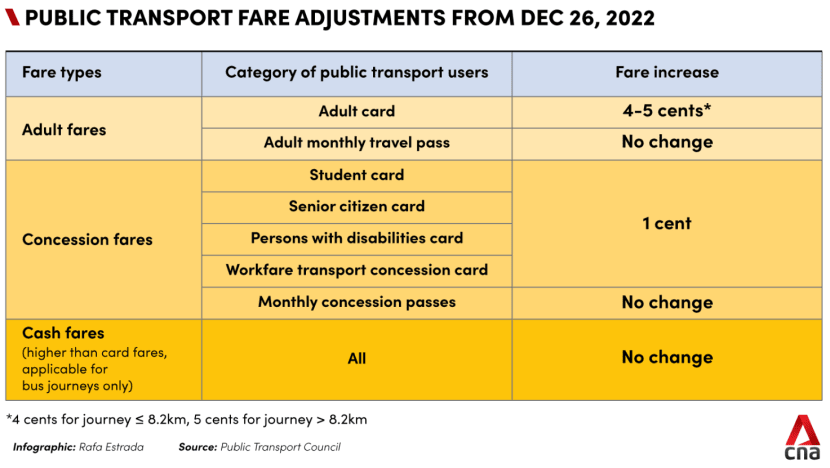Bus, train fares to increase by up to 5 cents due to rising energy costs: Public Transport Council
From Dec 26, adult card fares will increase by 4 cents for journeys of up to 8.2km. For journeys longer than 8.2km, fares will increase by 5 cents.
SINGAPORE: Bus and train fares in Singapore will increase by up to 5 cents from Dec 26 due to rising energy prices, the Public Transport Council (PTC) announced on Wednesday (Oct 12) after its annual fare review exercise.
Adult card fares will increase by 4 cents for journeys of up to 8.2km and 5 cents for journeys longer than 8.2km.
This means that an MRT journey from Boon Lay to Clementi, where the distance is 8.2km, will be S$1.45 for adult commuters, up from S$1.41 currently. Taking the MRT from HarbourFront to Paya Lebar, where the distance is 11.5km, will cost S$1.64, up from S$1.59.
Based on travel data, about 54 per cent of adult journeys are less than 8.2km, said the PTC.
The increase in concession card fares will be capped at 1 cent per journey to keep fares lower for students, senior citizens, lower-wage workers and people with disabilities, said the PTC.
Prices of monthly concession passes and adult monthly travel passes will remain unchanged. Bus cash fares will also stay the same, for the third year in a row since 2019.
To help lower and lower-middle income households – those with a monthly household income per person of up to S$1,600 – the Government will give out 600,000 public transport vouchers worth S$30 each, which can be used to top up fare cards or buy monthly concession passes.

RISING ENERGY, LABOUR COSTS
The fare hike is necessary to meet rising energy prices, which rose by 117 per cent last year, the PTC said.
Coupled with increased manpower costs and inflation, this led to a maximum allowable fare adjustment quantum of 13.5 per cent according to PTC’s fare adjustment formula. This is the highest quantum generated by the fare formula since it was implemented in 2005.
However, the PTC said it decided to grant public transport operators a fare increase of just 2.9 per cent due to concerns over the rising cost of living. The remaining 10.6 per cent will be carried over to future fare review exercises.
About 1.8 per cent of household income goes to public transport for an average user, according to the public transport affordability indicator, which is based on data from the Department of Statistics.
With this year's fare hike, and taking into account average wage increases, the PTC said the monthly public transport expenditure for these households is expected to remain at a similar level.
At a press conference on Wednesday, PTC chairperson Janet Ang said the council looks at both the economic situation as well as the percentage increase generated by the fare formula.
“We will digest it together as a community,” she added.
Transport Minister S Iswaran said in a Facebook post after the announcement that "fare adjustments are never easy".
"To keep our public transport system financially sustainable, fares need to be updated to cover the increased costs," he wrote.
The Government will cushion the impact with public transport vouchers, concession schemes and subsidies, and ensure that fares remain affordable especially for the vulnerable, he added.
As of last month, public transport ridership has recovered to about 80 per cent of pre-pandemic levels, said the PTC.
Last year, bus and train fares in Singapore increased by up to 4 cents, after the council decided to grant the maximum allowable fare adjustment quantum of 2.2 per cent to help operators mitigate the costs of running public transport services.
This came amid rising operating costs and a drop in ridership due to the COVID-19 pandemic.
It marked the first fare increase since 2019, when fares were increased by 7 per cent, or 9 cents per journey, for adult commuters using travel cards.
During its 2020 fare review exercise, the PTC decided against raising public transport fares due to the COVID-19 crisis and its impact on the economy.
CALCULATING FARE ADJUSTMENTS
In August, the PTC announced that it was in the midst of reviewing the way bus and train fare adjustments are calculated.
The review of the formula and mechanism for adjusting public transport fares is slated to be completed by the first half of next year. Any change will be applied from the 2023 fare review exercise.
Typically conducted every five years, it aims to examine the effectiveness of the current fare adjustment formula and mechanism, taking into account changes in the public transport industry and commuting patterns.
PTC also said then that it would propose means to better maintain the balance to keep public transport fares affordable while ensuring the financial sustainability of the public transport system.


















